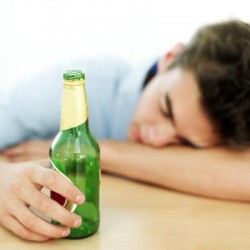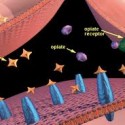Combination Benefits Patients With Comorbid Depression, Alcoholism
Treatment that combines sertraline and naltrexone appears to be superior to treatment with either drug alone, as well as to placebo, for individuals with depression and alcohol dependence.
Patients receiving the combination treatment were more likely to achieve abstinence and had delayed relapse to heavy drinking, according to a report posted in the March 15 AJP in Advance.
“[T]he co-occurrence of depression and alcohol dependence is highly prevalent and difficult to treat successfully,” wrote Helen Pettinati, Ph.D., and colleagues at the University of Pennsylvania Treatment Research Center. “The present findings suggest that patients with both disorders would benefit from combination treatment with an antidepressant and medication for alcohol dependence. More patients receiving the medication combination achieved abstinence from alcohol compared with patients receiving single-medication or placebo treatments. In addition, more patients in the medication-combination group were not depressed at the end of treatment.”

Alcohol dependence and depression get the best of you.
The effect of the combination treatment on both drinking and depression is noteworthy, as there has been limited and contradictory evidence in the literature on the efficacy of antidepressants in patients with alcohol dependence.
In this study, 170 men and women, aged 21 to 75, were randomly assigned to one of the following four treatment conditions for 14 weeks:
- 42 patients received naltrexone (100 mg/day) plus sertraline (200 mg/day)
- 49 patients received naltrexone (100 mg/day) plus placebo
- 40 patients received sertraline (200 mg/day) plus placebo
- 39 patients received double placebo.
- All patients also received 14 weeks of cognitive-behavioral therapy.
All patients had DSM-IV diagnoses of major depression and alcohol dependence. Inclusion criteria were consumption of an average of at least 12 alcoholic drinks per week, consumption of an alcoholic drink on at least 40 percent of the 90 days before treatment, three days of consecutive abstinence just before starting treatment, and a Hamilton Rating Scale for Depression (HAM-D) score of at least 10 at the time of randomization.
Primary drinking outcomes were total abstinence, defined as the percentage of patients who were abstinent on all days of the 14-week treatment period, and time to relapse. The latter was defined as the median number of days in treatment before a heavy drinking day. (A heavy drinking day was defined as consumption of at least five drinks in one day for men and at least four drinks in one day for women.)
Primary depression outcomes were no depression at the end of treatment—defined as a HAM-D score of 9 or less in the final three weeks of treatment—and HAM-D score in the last treatment week. Results showed that more patients in the sertraline plus naltrexone group (53.7 percent) were abstinent for the 14 weeks of treatment than the patients in the other groups combined.
Although there were no statistical differences among the groups across the 14 weeks with regard to depression, the sertraline plus naltrexone group appeared to have lower HAM-D scores during selected weeks relative to the other groups, and the sertraline group appeared to have higher HAM-D scores during selected weeks relative to the other groups.
“The depression outcome findings in our study were surprising in light of the findings in selected prior literature reporting that depressed alcohol-dependent patients had a more robust reduction in depressive symptoms with an antidepressant than with placebo,” the authors stated. “However, our study found no advantage in treatment with sertraline alone in depressive symptom reduction, and, potentially, portrayed a tendency for a slower mood improvement rate with sertraline over the 14 weeks of treatment compared with the other treatment groups. A tentative observation from our depression outcome results … is that there may be relatively little advantage in prescribing an antidepressant alone for depressed patients who are also alcohol dependent.”
The study was supported by a grant from the National Institute on Alcohol Abuse and Alcoholism and by Pfizer Inc., manufacturer of sertraline, which donated the drug and placebo for the study.
source: http://pn.psychiatryonline.org


